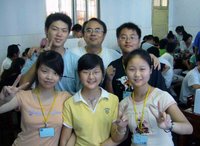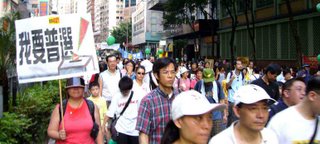 Students in
Students in Normally the high school students there have a summer break from mid July to end of August, similar to secondary schools in
Even the headmaster of the school we visited said he pitied the students, who “get so tired”! No kidding.
 Students in
Students in Normally the high school students there have a summer break from mid July to end of August, similar to secondary schools in
Even the headmaster of the school we visited said he pitied the students, who “get so tired”! No kidding.

It is a form of “service learning” that is now increasingly popular in many countries all over the world. In this case, our students learn and practice new computing skills, learn to teach and interact with Chinese students, interact with each other and the church team, spend a week in a city in China which they would not normally visit, and have great fun in the process.
It was hot! Daytime temperature was about 35 degrees Celsius. Even in the air conditioned classrooms, it was 30 degrees. But it was fun. HuangShi is one of the largest cities in
They were curious and eager. They were very interested in knowing about Hong Kong, about other cities in
They were also interested in Christianity. They felt they are free to believe in what they want and some have been to local churches. Many know, to differing degrees, about Christmas, Easter and Jesus. If you wish to know more about this aspect of the trip, send me email.
Our university students behaved admirably. They were fun-loving and energetic, resourceful, disciplined, demonstrated great teamwork among themselves, and mixed well with the church team as well as the local kids. They are students that we, as their teachers, can be proud of.

My daughters, like many HongKongers, doubted the usefulness of the march, since the government was not likely to give us universal suffrage anytime soon, if ever. My response is that I should do something if I believe in it strongly enough, even if it seems impossible. If enough people work hard and long enough, the impossible will become possible. If we all wait for the impossible to become possible, they will also remain impossible. Universal suffrage will not solve all our problems, but it is better than what we have presently, and no more than what we deserve.
The first marchers started from Victoria Park at about 3:30PM. Our family started at about 4:15PM and arrived at Central about 6PM. How many people marched? The average between the numbers claimed by the organizers and the police was about 40,000. To me, marching in the crowd, it felt like a lot of people anyway